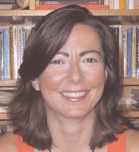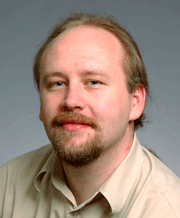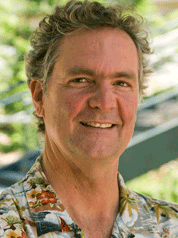Plenary Speakers
Tuesday, December 3, 08:30 - 09:30

Jelena Kovačević, Carnegie Mellon University, Problems in Biological Imaging: Opportunities for Signal Processing
In recent years, the focus in biological sciences has shifted from understanding single parts of larger systems, sort of vertical approach, to understanding complex systems at the cellular and molecular levels, horizontal approach. Thus the revolution of "omics" projects, genomics and now proteomics. Understanding complexity of biological systems is a task that requires acquisition, analysis and sharing of huge databases, and in particular, high-dimensional databases. Processing such huge amount of bioimages visually by biologists is inefficient, time-consuming and error-prone. Therefore, we would like to move towards automated, efficient and robust processing of such bioimage data sets. Moreover, some information hidden in the images may not be readily visually available. Thus, we do not only help humans by using sophisticated algorithms for faster and more efficient processing but also because new knowledge is generated through use of such algorithms.
The ultimate dream is to have distributed yet integrated large bioimage databases which would allow researchers to upload their data, have it processed, share the data, download data as well as platform-optimized code, etc, and all this in a common format. To achieve this goal, we must draw upon a whole host of sophisticated tools from signal processing, machine learning and scientific computing. I will address some of these issues in this presentation, especially those where signal processing expertise can play a significant role.
Jelena Kovačević received a Ph.D. degree from Columbia University. She then joined Bell Labs, followed by Carnegie Mellon University in 2003, where she is currently a Professor in the Departments of BME and ECE and the Director of the Center for Bioimage Informatics. She received the Belgrade October Prize and the E.I. Jury Award at Columbia University. She is a coauthor on an SP Society award-winning paper and is a coauthor of the books "Wavelets and Subband Coding” and "Foundations of Signal Processing". Dr. Kovacevic is the Fellow of the IEEE and was the Editor-in-Chief of the IEEE Transactions on Image Processing. She was a keynote speaker at several meetings and has been involved in organizing numerous conferences. Her research interests include multiresolution techniques and biomedical applications.
Wednesday, December 4, 08:30 - 09:30

Piotr Indyk, Massachusetts Institute of Technology, Recent Developments in the Sparse Fourier Transform
Piotr Indyk is a Professor of Electrical Engineering and Computer Science at MIT. He joined MIT in 2000, after earning PhD from Stanford University. Earlier, he received Magister degree from Uniwersytet Warszawski in 1995. Piotr's research interests lie in the design and analysis of efficient algorithms. Specific interests include: high-dimensional computational geometry, sketching and streaming algorithms, sparse recovery and compressive sensing. He has received the Sloan Fellowship (2003), the Packard Fellowship (2003) and the MIT Faculty Research Innovation Fellowship (2012). His work on sparse Fourier sampling has been named to Technology Review "TR10" in 2012, while his work on locality-sensitive hashing has received the 2012 Kanellakis Theory and Practice Award.
Thursday, December 5, 08:30 - 09:30

David Haussler, University of California, Santa Cruz, Cancer Genomics
University of California, Santa Cruz has built the Cancer Genomics Hub (CGHub) for the US National Cancer Institute, designed to hold up to 5 petabytes of research genomics data (up to 50,000 whole genomes), including data for all major NCI projects. To date it has served more than 8.3 petabytes of data to more than 300 research labs. Cancer is exceedingly complex, with thousands of subtypes involving an immense number of different combinations of mutations. The only way we will understand it is to gather together DNA data from many thousands of cancer genomes so that we have the statistical power to distinguish between recurring combinations of mutations that drive cancer progression and "passenger" mutations that occur by random chance. Currently, with the exception of a few projects such as ICGC and TCGA, most cancer genomics research is taking place in research silos, with little opportunity for data sharing. If this trend continues, we lose an incredible opportunity.
Soon cancer genome sequencing will be widespread in clinical practice, making it possible in principle to study as many as a million cancer genomes. For these data to also have impact on understanding cancer, we must begin soon to move data into a global cloud storage and computing system, and design mechanisms that allow clinical data to be used in research with appropriate patient consent. A global alliance for sharing genomic and clinical data is emerging to address this problem. This is an opportunity we cannot turn away from, but involves both social and technical challenges.
Reference: http://www.eecs.berkeley.edu/Pubs/TechRpts/2012/EECS-2012-211.html
David Haussler leads the team that posted the first publicly available computational assembly of the human genome sequence on the Internet on July 7, 2000. Since then, as a distinguished professor of biomolecular engineering at the University of California, Santa Cruz, he has led efforts to develop tools to understand the meaning inside the DNA code. His team's analysis tools help make it possible to understand the changes to individual genomes that drive health and disease. He is an organizing member of a new global alliance of the top research, health care, and disease advocacy organizations that have taken the first steps to standardize and enable secure sharing of genomic and clinical data. David leads the alliance’s computational genomics research, which is the crucial component of all genomic medical research. Among other benefits, this effort will unlock the power of the genome for understanding cancer and rare diseases.
Haussler received his Ph.D. in computer science from the University of Colorado at Boulder and belongs to the National Academy of Sciences and the American Academy of Arts and Sciences.